#&&( controversial; so outspoken; i’ve been told i’m not ladylike ) → conversations
Explore tagged Tumblr posts
Text
starter for: @rwstarters
location: her booth at the winter festival
time: any
Sanem dipped her brush into the white paint for the last time to finish her masterpiece of a unicorn. It felt like she had painted a unicorn for the billionth time that day. And for the life of her, she couldn’t remember why she had agreed to sign up to do this.
It all became clear once the little girl lit up upon seeing the finished product. Sanem braced herself with a laugh as her customer threw her arms around her neck with a squealed thank you! and begging her guardian to admire the pretty unicorn. The stiff ache of her back went away with roaring approval.
“If you’ll give me just a moment, I’d be happy to help you with a face-painting sesh. Unless you’d like a flyer?” she suggested. Her artwork hung behind her, along with some vases on a shelf. “All this stuff behind me’s for sale and I do tattoo work, too.”

#rw.starter#rw.event001#&&( controversial; so outspoken; i’ve been told i’m not ladylike ) → conversations
5 notes
·
View notes
Text
Why ‘The Oklahoma City Dolls’ is the best sports film of all time

A huddle in Oklahoma City Dolls (1981). | Oklahoma City Dolls/Sony Pictures Television
Clichés get new weight when they’re about equality.
The best sports film of all time is a 1981 made-for-TV movie called The Oklahoma City Dolls.
This is not an assertion made lightly. Sports have inspired countless memorable films, and I, for one, certainly can’t profess to have seen them all. Nevertheless, it’s hard to imagine that any of the others tell as smart — and as progressive — a story as the mostly-forgotten Dolls, which you can only currently watch via YouTube bootlegs.
Name another movie that articulates class struggle via a group of blue-collar women fighting to form their own football team, complete with thoughtful, but not forced, discussions of gender politics and labor rights. In that light, Waylon Jennings’ on-screen debut as the befuddled love interest is just the icing on the cake.
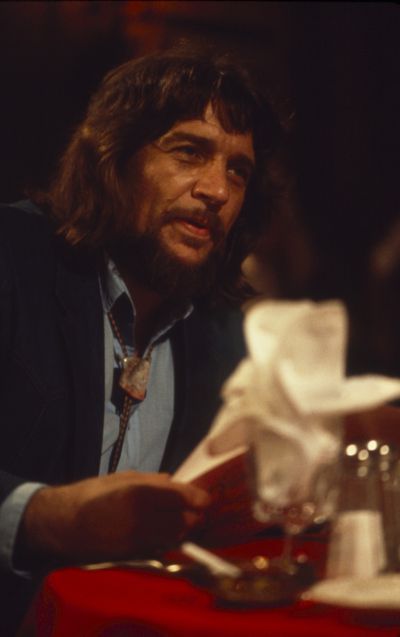
Photo by Walt Disney Television via Getty Images
“It held up better than we would have thought,” says Susan Blakely, 71, who starred as Sally Jo Purkey — a disgruntled factory worker turned quarterback. She and her 76-year-old husband Steve Jaffe, who was among the film’s producers, watched the movie for the first time in almost 40 years before speaking with me. The couple had done Dolls as part of a three-picture deal Blakely had signed with ABC after the success of miniseries Rich Man, Poor Man (for which Blakely won a Golden Globe). “They gave us a bunch of scripts, and I thought this one was just terrific,” she adds.
The movie, which was written by Ann Beckett, is loosely based on a real team. The Oklahoma City Dolls were a semi-pro team that played for three years in the late 1970s, as part of a larger vogue for women’s football during that period. Though the Hollywood version, produced in part by an all-women company called Godmother Productions, is heavily fictionalized, the liberties taken make the Dolls’ story more — not less — controversial. The team’s battle to get on the field serves as both a broad metaphor for equality and an allusion to a specific, timely fight.
“I was very political,” Blakely says. “That was what attracted me to the script.” She’s been outspoken since her days as a model in the early ‘70s, when she organized the “Models for McGovern” group — “Ford [Models] was furious,” she says, laughing — and had a particular interest in women’s rights. “I was definitely a feminist,” she adds, in case you couldn’t tell as much from the picture of her onstage alongside Gloria Steinem.
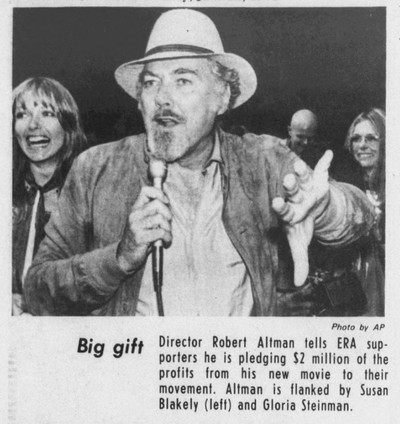
A 1978 clip from the Ithaca Journal.
Blakely had spent much of the late 1970s pushing for the passage of the Equal Rights Amendment — a period that coincided with her greatest visibility thanks to Rich Man, Poor Man. When Cosmo asked her, “What’s your worst fear?” in 1980, she quipped, “That the Equal Rights Amendment will pass and we’ll elect our first woman president and vice president: Phyllis Schalafly and Anita Bryant.” Oklahoma City Dolls was filmed that same year, when the bill’s passage before the revised 1982 deadline was looking less and less possible.
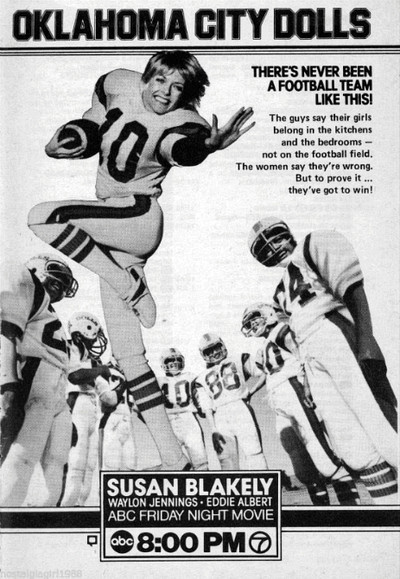
An ad that appeared in TV Guide for the movie.
The movie begins with Purkey, a single mother working the line at a valve factory (they filmed in a real factory) for $40 a week, goofing around with her female coworkers. Where are the men? Well, they’re out playing for the company football team — which they get time off to do, while the women have to “pick up the slack” back at the factory with no extra pay. “You know what I’ve always said about you?” the middle manager tells Purkey when she has the audacity to have a conversation with a colleague. “You’ve got no company loyalty.”
As it turns out, her lack of loyalty should be the least of his concerns. Purkey files a complaint about the unequal conditions with the EEOC, and because the company is a potential government contractor, the agency takes it seriously. An official shows up and tells the boss they’ll have to give the women equal time off.
The boss, Mr. Hines, thinks he’s got it all figured out when he tells the women on the factory line that the only way they can get time off is if they play football, too. The trouble starts (for him, at least) when they take him up on that offer.
It’s not an easy road for the women, but you can probably guess where it ends. The strength of the dialogue, though, turns what might have easily been trite into a piece that’s quite powerful. After their first attempt at a practice, for example, the women are discouraged: it’s hard, and they’re already facing resistance from the men in their lives. “I’m afraid Ray’s going to kill me if he finds out,” the most promising wide receiver says quietly.
But Purkey’s response to the general dismay isn’t just a pep talk — it’s practically a consciousness-raising.
“The problem ain’t in our muscles, it’s in our heads!” she shouts, clutching her own in her hands. “There’s no reason on this Earth that a bunch of women can’t learn to run a ball back and forth between four goal posts just as easily as a bunch of men! Heck, I used to play football when I was a kid and I was pretty good too! Baseball, basketball, kickball — you name it! I loved all that stuff, until one day some adult told me it wasn’t feminine. That a woman has to act like a lady, flouncing around.
“Seems to me now that giving birth to babies ain’t particularly ladylike,” she continues, to chuckles around the room. “And making love ain’t necessarily ladylike,” Purkey adds as the women whoop.
“So what’s wrong with a little football, eh?”
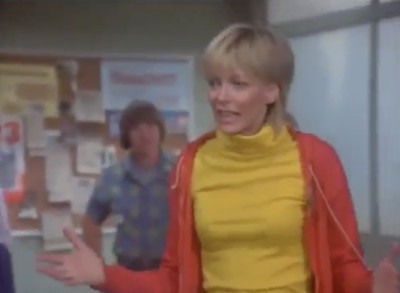
Oklahoma City Dolls/Sony Pictures Television
Sally Jo (Susan Blakely) tells it like it is in Oklahoma City Dolls.
That scene was one Blakely says she tweaked to better reflect her own experience. When they were just a week or so into filming, the Screen Actors Guild went on strike — so she had six weeks to work on both her football prowess with the assistance of Jaffe, who had played in high school, and to revise some of her scenes.
“That was a scene that I worked on the most of any of them,” she recalls of the “ladylike” monologue. “I played a lot of sports as a kid — I was a gymnast, a runner, a swimmer, a tennis player, a golfer. I did try and play a little football with my older brother, but he was like, 6’10 when he was 13, and he would only play tackle. Anytime I’d get the ball, my brother would come right at me.
“But my father would always say, ‘You don’t have to win all the time when you’re playing against the guys. I would be like, ‘Well, then why are you even telling me to get better at it at all?’”
Blakely translated that feeling — the acute sense of unfairness women and girls face in sports, and beyond — into the scene, and most of the movie. Even though she says regrets coming off “a little too angry,” she’s just as frustrated now by the fact the injustices shown in the film haven’t been resolved. “We’re still dealing with women getting less money for the same jobs,” she points out. The Equal Rights Amendment still hasn’t been passed.
During the six-week strike, Blakely found herself mirroring Sally Jo: The women who had been cast as football players were crammed in hotels near the Columbia backlot where they were filming, seemingly six to a room as Blakely recalls it, with no cars. “I wouldn’t go on shooting until they got them two to a room, and cars,” she says. “I became like my character. Persona non grata at Columbia but …”
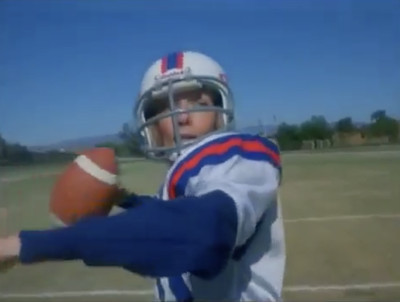
Oklahoma City Dolls/Sony Pictures Television
Sally Jo (Blakely) steps back to pass in Oklahoma City Dolls.
She and the other actors had to learn football, although a male stunt double handled Purkey’s play in the game scenes. The stunt coordinator, Allan Graf, was himself a retired football player — he started on USC’s undefeated 1972 team, and briefly signed with the Rams. He would go on to manage stunts for just about every memorable football movie, including Any Given Sunday, The Waterboy, The Replacements, Jerry Maguire and Friday Night Lights.
Jaffe himself had toyed with the idea of doubling Blakely on the field just to get a chance to play again, but ultimately decided against it. Like Blakely, though, he has fond memories of his time on set. “The idea that I would watch two full-fledged women’s teams playing against each other was phenomenal,” he says now — offering nearly the opposite perspective to Jennings’ character in the movie, whose skepticism compels Purkey to direct one of her signature barbs his way: “If you can’t hack being a quarterback’s boyfriend,” she tells him on a date, “I suggest you go find some frilly little thing who stands around in the kitchen all day and doesn’t embarrass you. I hope she bores you to death.”
“Having my wife be the quarterback was really wonderful to watch,” Jaffe adds. “To see her blossom as a real quarterback … We would throw the ball around in the backyard, and she got better and better at pinpointing her shots.
“One time she actually ran me right out of the backyard and into our Jacuzzi,” he recalls, and they both dissolve into laughter.
The warmth with which they remember Dolls’ filming is echoed on screen, populated almost exclusively by women who find enormous camaraderie in solidarity — and sports. It’s a story about plucky underdogs triumphing on the field, yes, but with bold and very nearly intersectional takes on all the unfairness happening off it. By the end of the film, a neighbor woman has named her newborn baby Sally Jo, and frankly, it’s easy to understand why.
0 notes
Text
drippingsunflwrs:
to: open ( @rwstarters) location: once upon a tart

the time to redecorate for the season had finally come. sol was thrilled to be able to take down the fall decorations and replace them with the winter ones. her favorite season had always been fall, they loved to watch the colors of the season change with time, but this year she was feeling the winter spirits full force. by the time sol saw someone approaching once upon a tart she were in the middle of hanging up some white christmas lights that had little icicles hung up on every other bulb, all they needed was to be able to get them around a small hook on the corner of the front of the shop, she silently cursed herself for not moving the small ladder a smidgen closer but it was too late now. “hello down there!” she happily greets, offering a warm smile to the new comer, or perhaps they were a regular, who they were sol currently couldn’t tell due to their gaze being focused on trying to get the lights on this hook. “i’ll be right down!” she assured, just before taking one small little push and tossing the line over the hook in hopes it would land and not miss. success. in their hands was the remote they needed to start the lights up which they clicked and illuminated the front of the shop. bright white christmas lights were weaved around the letters of once upon a tart, making the shop shine bright in the dimness of the night. “what do you think? there’s still so much that needs to be done, but believe it or not, the lights took up a good portion of the day.” she chuckled, coming down from the ladder, “anyway, sorry about that wait. how can i help you this evening? “
.
Vermont winters tended to come in like a lion and leave like a lamb. There were times Sanem had to duck from one area to another in order to avoid the cold. Her threshold for cold varied day to day and today seemed to be an all-time low.
Once Upon a Tart was one of her favorite places to stop in when she had time and she was greeted with a rush of warm air upon entry.
“Sorry, I came in to get warm and snag a quick cup of coffee, take your time,” she assured the other woman as she plucked her beanie from atop her head. She quickly shoved it into her pocket. “Everything looks great, though. Gotta love the winter festival, right?”

to: open ( @rwstarters) location: once upon a tart
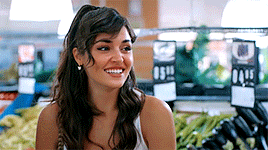
the time to redecorate for the season had finally come. sol was thrilled to be able to take down the fall decorations and replace them with the winter ones. her favorite season had always been fall, they loved to watch the colors of the season change with time, but this year she was feeling the winter spirits full force. by the time sol saw someone approaching once upon a tart she were in the middle of hanging up some white christmas lights that had little icicles hung up on every other bulb, all they needed was to be able to get them around a small hook on the corner of the front of the shop, she silently cursed herself for not moving the small ladder a smidgen closer but it was too late now. “hello down there!” she happily greets, offering a warm smile to the new comer, or perhaps they were a regular, who they were sol currently couldn’t tell due to their gaze being focused on trying to get the lights on this hook. “i’ll be right down!” she assured, just before taking one small little push and tossing the line over the hook in hopes it would land and not miss. success. in their hands was the remote they needed to start the lights up which they clicked and illuminated the front of the shop. bright white christmas lights were weaved around the letters of once upon a tart, making the shop shine bright in the dimness of the night. “what do you think? there’s still so much that needs to be done, but believe it or not, the lights took up a good portion of the day.” she chuckled, coming down from the ladder, “anyway, sorry about that wait. how can i help you this evening? "
3 notes
·
View notes
Text
open starter for @rwstarters
location: grocery store
The price of food was insane. Over twenty-five dollars for five dozen eggs? Sanem lived alone and therefore, bulk shopping wasn't the best idea, but now she toyed with the idea of investing in a bulk store membership. It would make buying dog food much easier.
Someone aggressively flirting with her made her blanch. After all, who wanted to get picked up in the bread aisle? She just wanted her butter bread.
"I will buy your grocery haul if you pretend to know me," she murmured to the nearest person.

2 notes
·
View notes
Conversation
Text → Mattie
Beau: Mattie, my beloved. My good amigo, my pal, my friend in the French language that I'm completely blanking on.
Beau: Did you happen to have any contacts in search of good art? I'm tentatively opening my commissions again.
1 note
·
View note